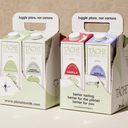We tried it: Pistachio milk

Most milk alternatives don't taste like the ingredient they feature (oat, almond, cashew, etc.) — but a newcomer called pistachio milk does, and delightfully so.
Why it matters: Pistachios are all the rage (witness the Starbucks Pistachio Latte and Pistachio Cream Cold Brew), as are milk alternatives.
- Despite pushback from the beleaguered dairy industry, the Food and Drug Administration is letting plant-based products use the name "milk."
Driving the news: A three-year-old company called Táche, founded by an Iranian-American named Roxana Saidi who grew up eating lots of pistachios, is trying to turn the product category mainstream.
- Táche sent me four cartons of pistachio milk to sample: original, vanilla and unsweetened versions of both.
Taste test: My partner, Cliff, and I were surprised at how much we liked them — all the flavors worked well with breakfast cereal, oatmeal and coffee, and were pleasant just to drink straight.
- The original option is creamy and tastes like a pistachio version of chocolate milk — without being too sweet. The original vanilla tastes like an indulgent barista drink (at 80 calories a cup).
- The color is more tannish than greenish, but it's pleasant enough.
- The unsweetened varieties, at 50 calories a cup, were similar to the unsweetened vanilla almond milk we usually drink, but felt richer and more flavorful.
What they're saying: "The most common reaction we get is that it tastes like pistachio gelato, just not nearly as sweet," Saidi tells Axios.
- "A lot of people are using it in place of oat or almond, but also in place of coconut, soy and even dairy," said Saidi, whose company employs seven people and is based in New York City.
- "Unlike almond milk, Táche has a really nice mouth feel."
- Most people are getting introduced to her product through the high-end coffee bars with which Táche has made agreements — a welcome development for Saidi. "Growing up in San Francisco, I was the kid who had a little Ziplock baggie of pistachios on the playground," she said.
Details: According to Táche, "our pistachios have a 75% smaller water footprint than almonds" — which are constantly trying to fight their image as climate-killing water hogs.
- Another Táche claim: "We're better for you than oat milk — no added oils!"
- A website called Pistachiomilk.org assesses health claims like this, as does Real Simple, which concludes: "If you have a well-balanced diet, it likely won't matter if you opt for almond, oat, pistachio, or one of the other options on the market. If you love the taste (and hue), go for it!"
Yes, but: Pistachio prices are climbing because they're in demand. And Táche is both expensive and hard to find. (Here's a store locator.)
- A six-pack costs $54 — $9 a quart — on the company's website.
- A quart of almond milk, by contrast, tends to cost between $2.25 and $5.
Where it stands: Pistachio milk isn't the only milk alternative trying to break into the market — camel milk, anyone? — but it does seem auspiciously positioned.
- America's love affair with pistachios has brought an explosion of new drinks and other products, including Wonderful Pistachio's new "in-shell" flavored nuts, Keurig's pistachio ice cream coffee and various pistachio pastes, butters and flours.
- Táche isn't the only pistachio milk brand on the market: Elmhurst sells a two-pack of "barista pistachio milk" quarts for $13.99, and Three Trees sells a 28-ounce container for a suggested price of $7.99 (retailers tend to charge $8-$9).
"Our pistachio milk is one of our strongest sellers," Audrey Koh, national sales director at Three Trees, tells Axios.
- "We've been hearing about pistachio as a quiet luxury, and I feel like there has been over the past year an increase of interest not just from retail buyers but people in the grocery stores."
- Three Trees, which also makes almond and oat milk, sells its pistachio milk in chains like Wegmans and Whole Foods on the West Coast.
Zoom out: The FDA's website on plant-based milk alternatives ("PBMAs") hasn't caught up with the pistachio trend yet — but does give a helpful inventory of what's on the market.
- "Plant-based products that are marketed and sold as alternatives to milk are made from nuts (including hazelnuts, walnuts, coconuts, cashews, and almonds), seeds (including sesame, flax, and hemp), rice, oats, or legumes (including soy)."
The bottom line: If pistachio milk companies play their cards right and other people like their products as much as Cliff and I did, expect to see these cartons popping up at coffee bars near you.